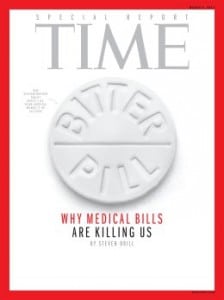
Last week’s cover story in Time featured a 24,000-word article titled, “Bitter Pill: Why Medical Bills Are Killing Us.”
The article, written by Steven Brill, is a penetrating examination of U.S. medical costs, which now eat up roughly 17% of United States GDP.
It asks the kinds of questions that millions of Americans have inquired regarding the exorbitant price of U.S. medical care.
Here’s an excerpt:
“What are the reasons, good or bad, that cancer means a half-million- or million-dollar tab? Why should a trip to the emergency room for chest pains that turn out to be indigestion bring a bill that can exceed the cost of a semester of college? What makes a single dose of even the most wonderful wonder drug cost thousands of dollars? Why does simple lab work done during a few days in a hospital cost more than a car? And what is so different about the medical ecosystem that causes technology advances to drive bills up instead of down?”
The article is serious black eye for the medical profession and stands to be a major setback PR-wise for all parties involved in providing healthcare, er, sick care.
But the response to the article from the healthcare field, so far, has been radio silence.
Among all of the various medical associations and healthcare providers that have a vested interest in “Bitter Pill,” PR News could find nada one that chose to dignify the story via their website, no less try and tell its side of the story.
Brill’s piece drew no response from the American Hospital Association, the American Medical Association, the American Pharmaceutical Association, the National Association of Insurance Commissioners or the National Association of Health Underwriters.
Perhaps the medical field at large is betting that the article will blow over and simply play itself out after circulating through a few news cycles.
However, by failing to respond to the article the medical profession betrays more than a PR failure.
In light of the article—and its many examples of people facing financial destitution because of suffering from a serious illness—the medical profession may be setting up itself for even more of the type of government regulation that it tends to bemoan.
A failure to respond only lends itself to the already lousy perception that consumers have about the healthcare industry. And in a social-media age, a reactionary stance to such a scathing article only adds insult to injury.
Can you say PR 101?
Follow Matthew Schwartz: @mpsjourno1
